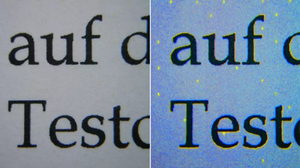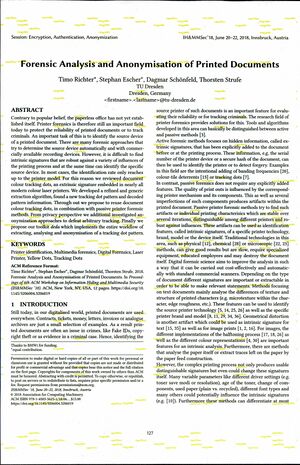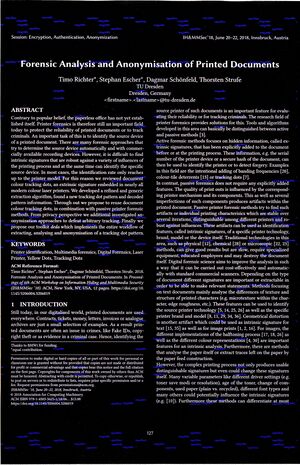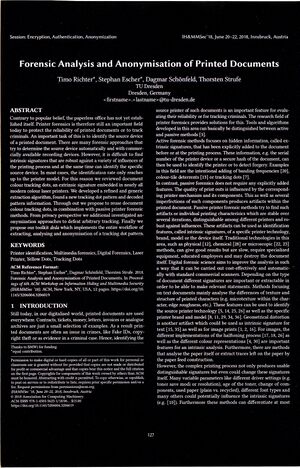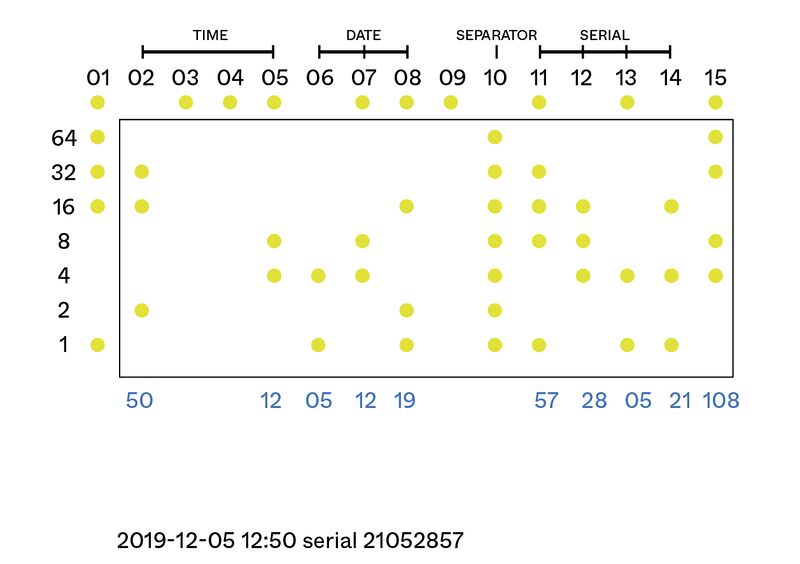User:Pedro Sá Couto/MIC: Difference between revisions
| (29 intermediate revisions by the same user not shown) | |||
| Line 3: | Line 3: | ||
=What is the Machine Identification Code= | =What is the Machine Identification Code= | ||
The Machine Identification Code is appended to every printed page. When printing, a pattern of dots is added.<br> | |||
The Machine Identification Code is appended to every printed page. When printing, a pattern of dots is added. These are almost imperceptible yellow dots carrying information as the date of print, time and the serial number of the machine. This made me rethink what did it mean to publish in print, how safe is it, and how it might affect the ones who depend on printed forms of publishing. | These are almost imperceptible yellow dots carrying information as the date of print, time and the serial number of the machine.<br> | ||
This made me rethink what did it mean to publish in print, how safe is it, and how it might affect the ones who depend on printed forms of publishing. | |||
<br> | <br> | ||
=Understanding if they are real= | =Understanding if they are real= | ||
I was not able to identify them personally even though they appear to be a reality. There are numerous people apparently spotting them and online there is a lot of discussion about them. I tested methods to identify with UV light, with different printers, from HP to Canon, from Inkjet to Lasers printers. I scanned the pages with | I was not able to identify them personally even though they appear to be a reality. There are numerous people apparently spotting them and online there is a lot of discussion about them.<br>I tested methods to identify with UV light, with different printers, from HP to Canon, from Inkjet to Lasers printers.<br>I scanned the pages with 600 dpi, inverted and follow almost every tutorial I found available online.<br>This is not to say they don't exist but is a disclaimer that I was not able to come across them. | ||
<br><br> | <br><br> | ||
[[File:finding01.jpg|300px]] | [[File:finding01.jpg|300px]] | ||
| Line 31: | Line 24: | ||
[[File:finding004.jpg|550px]] | [[File:finding004.jpg|550px]] | ||
= | =Appropriating this code= | ||
Until now I was not able to prove that they existed, and it was difficult to deal with that.<br> | |||
In this experiment, I am not stating that they are real.<br> | |||
What is real is the conversations that they create on online spaces. Users tried to keep each other aware of them. Many tutorials to instruct on how to find them were made available on different forums and a lot of articles have been published.<br> | |||
In this experiment, I decided to foment this conversation and embrace their ambivalence.<br> | |||
Another reason for exploring them is an urgency to call out the fact that the article I was reading "Forensic Analysis and Anonymisation of Printed Documents" (Richter et al., 2018) is somehow talking about surveillance and yet it is unsatisfying that I cannot get to the proof.<br> | |||
I decided to extrapolate on their use, not for trackability, but to narrate a parallel story to the text that is written.<br> | |||
[[File:2019-12-04_164502_regularr.jpg|300px]] | |||
[[File:2019-12-04_164502_invertedd.jpg|300px]] | |||
[[File:trackingdotss.jpg|690px]] | |||
< | <br> | ||
I have created my own watermark. This watermark was printed in font size so small that you would not be able to see it without scanning and magnifying it. Just as it happens with the tracking dots. | |||
The message happened was a critique of all the articles proving their existence, saying "LOOK FOR YOURSELF".<br> | |||
Guess what, I was able to not only see the watermark I had created but also the tracking dots. | |||
< | |||
= | =THEY ARE REAL= | ||
Two days before the assessment and I am finally able to prove that they exist.<br> | |||
Recently I bought a better print/scanner, able to scan with a higher density (1200 dpi). I was giving up on the existence of them but they prove to be real.<br> | |||
At the moment I still have to be able to isolate the pattern and later on try to decode it.<br> | |||
I will continue working on them in the 5th Trimester.<br> | |||
[[File:test2_dots_invertedd.jpg|300px]] | |||
[[File:trackingdotsreall.jpg|730px]] | |||
==DECODER== | |||
[[File:translation_dots.jpg|800px|Tracking Dots Decoder]] | |||
=Other experiments on MIC= | |||
https://pzwiki.wdka.nl/mediadesign/User:Pedro_S%C3%A1_Couto/MIC_experiments | |||
Latest revision as of 11:57, 10 December 2019
Machine Identification Code
What is the Machine Identification Code
The Machine Identification Code is appended to every printed page. When printing, a pattern of dots is added.
These are almost imperceptible yellow dots carrying information as the date of print, time and the serial number of the machine.
This made me rethink what did it mean to publish in print, how safe is it, and how it might affect the ones who depend on printed forms of publishing.
Understanding if they are real
I was not able to identify them personally even though they appear to be a reality. There are numerous people apparently spotting them and online there is a lot of discussion about them.
I tested methods to identify with UV light, with different printers, from HP to Canon, from Inkjet to Lasers printers.
I scanned the pages with 600 dpi, inverted and follow almost every tutorial I found available online.
This is not to say they don't exist but is a disclaimer that I was not able to come across them.
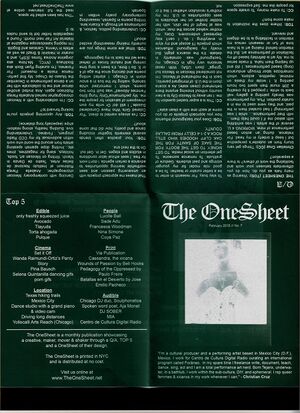
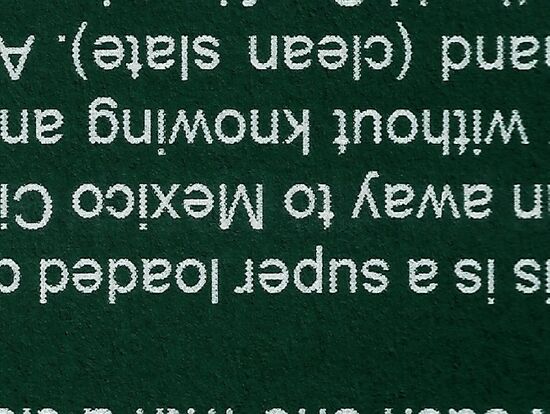
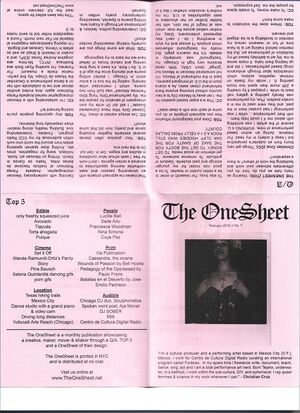
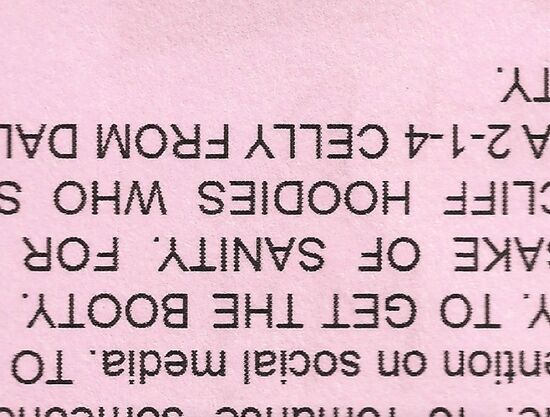
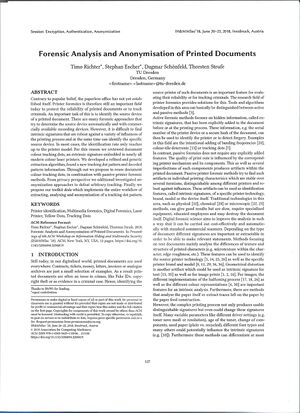
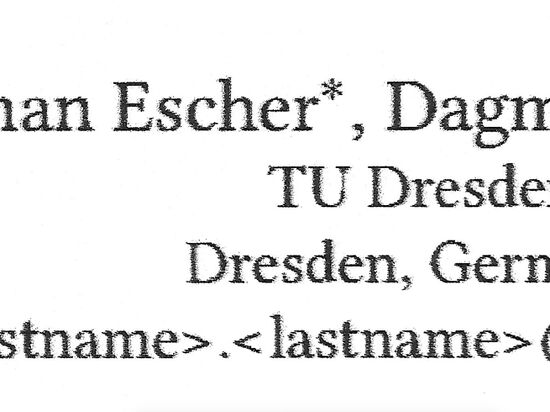
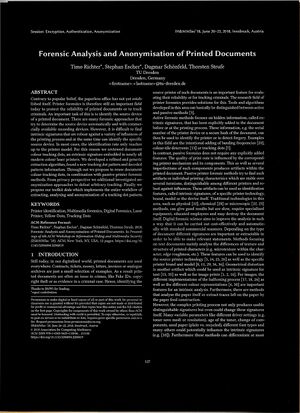
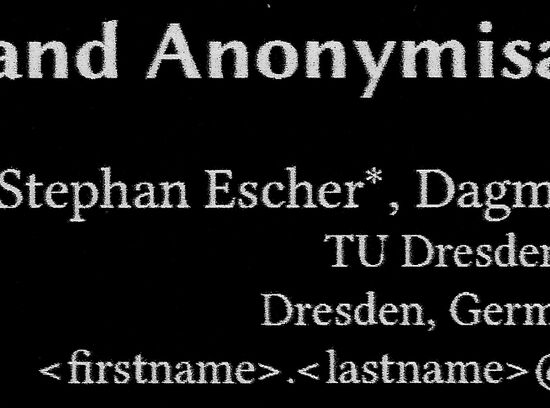
Appropriating this code
Until now I was not able to prove that they existed, and it was difficult to deal with that.
In this experiment, I am not stating that they are real.
What is real is the conversations that they create on online spaces. Users tried to keep each other aware of them. Many tutorials to instruct on how to find them were made available on different forums and a lot of articles have been published.
In this experiment, I decided to foment this conversation and embrace their ambivalence.
Another reason for exploring them is an urgency to call out the fact that the article I was reading "Forensic Analysis and Anonymisation of Printed Documents" (Richter et al., 2018) is somehow talking about surveillance and yet it is unsatisfying that I cannot get to the proof.
I decided to extrapolate on their use, not for trackability, but to narrate a parallel story to the text that is written.
I have created my own watermark. This watermark was printed in font size so small that you would not be able to see it without scanning and magnifying it. Just as it happens with the tracking dots.
The message happened was a critique of all the articles proving their existence, saying "LOOK FOR YOURSELF".
Guess what, I was able to not only see the watermark I had created but also the tracking dots.
THEY ARE REAL
Two days before the assessment and I am finally able to prove that they exist.
Recently I bought a better print/scanner, able to scan with a higher density (1200 dpi). I was giving up on the existence of them but they prove to be real.
At the moment I still have to be able to isolate the pattern and later on try to decode it.
I will continue working on them in the 5th Trimester.
DECODER
Other experiments on MIC
https://pzwiki.wdka.nl/mediadesign/User:Pedro_S%C3%A1_Couto/MIC_experiments

